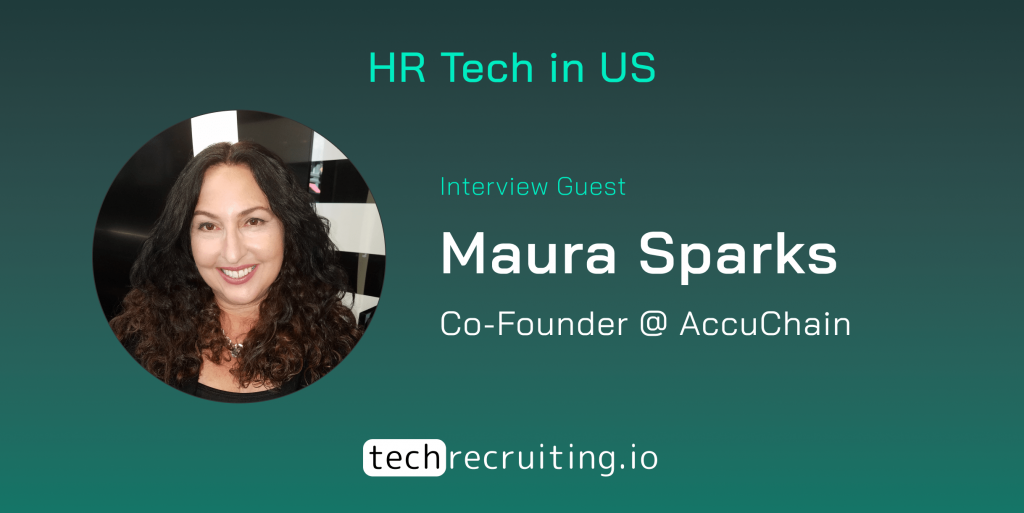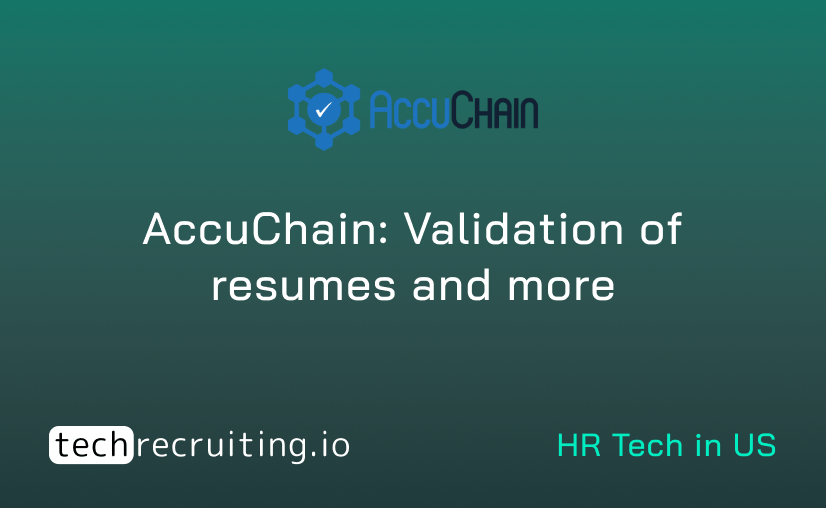In our category “HR Tech in US” we present HR tech companies from the USA and what the European HR world can learn from them.
In this interview, I spoke with Maura Sparks. She is Co-Founder of AccuChain, a company that validates resumes, ensuring that written content is accurate and AI free.
Maura, at AccuChain you developed Validator, a tool to prevent misinformation in resumes. How does it work?
We have developed a cloud-based resume validation and recruitment platform using proprietary validation processes to dramatically reduce false information in resumes. A jobseeker starts by building their resume in our resume builder. The user can upload and edit an existing resume or create a resume using prompts from the platform. The resume can be fully customized and content can be easily edited. In addition, the platform allows users to upload supporting documents, credentials, diplomas, portfolios and more. Each resume claim can be validated with the platform’s built-in validation system. The platform emphasizes factual information using trusted third party validators. The validator is someone familiar with each resume claim, such as: a manager, colleague, partner, client, or customer. The communication between the platform and the validator is automated by our platform. The platform’s validation uses a screening technique to fake accounts and validators. Once validated, the resume can be sent to hiring managers or HR departments. The jobseeker is providing a complete online profile we call an ‘Enhanced Digital Resume’.
Why is the validation of resumes so important? And how can technology help here?
The Society for Human Resource Management (SHRM) states 46% of resumes have false information. A resume filled with over-inflated claims can easily lead to a bad hire and cost companies up to $240,000. In addition, it can negatively impact project timelines and budget. Validated resumes have the potential to become a new standard in hiring, we wanted to create a platform based on having truthful information about the applicants. The platform was also designed for HR professionals to receive applications directly from jobseekers or find top qualified candidates from the platform’s dashboard tied to a job posting. Validator was designed to highlight positive validations and maintains a high level of integrity so hiring managers can have trust in their hires. Hiring decisions should be based on having truthful information about the applicants.
What AI development is taking place at AccuChain?
AccuChain is committed to ensuring written content is accurate and AI free. We are now expanding to detect AI generated content in other written content, including manuscripts, tv and film scripts, blogs, and articles to prevent issues in copyright laws. Publishers and writers who plan to publish and monetize their written content need to protect their work by copyrighting their content and it must be written by the author and free from plagiarism. By using our AI Detection Platform, Documenta, users can authenticate their work is free from AI generated content. Using AI as a tool for productivity is useful, but using it for written content could be problematic. Much like the ruling for screenwriters in Hollywood, AI can be used to generate ideas, but not write scripts. These are useful guidelines for all written content and it is logical to think these steps will be implemented in other industries. In addition, we also have plans to add more AI to Validator to improve the validation process.
What is HYRverse? And what is your goal with it?
HYRverse is a platform we’d like to build someday. We developed a prototype and were selected to the Polygon LEAP accelerator. We developed NFT versions of each profile that acted as a resume or portfolio. Integrating NFTs with smart contracts is a future area we may pursue. Our goal would be to expand Validator to a Web3 platform and create a career network built on trust. Talent and company profiles could be validated and minted. We believe hiring should be based on merit and by allowing a user’s identity to be private until hired it removes any bias. By ensuring that everything on their NFT is verified, it brings a high level of trust and minimizes bad actors. We put our web3 work on hold and are focused on Validator and Documenta right now.
Do you see the U.S. as a leader in artificial intelligence (AI)? What are you doing better than other nations?
The United States (US) is seen as the leader in Artificial Intelligence (AI) with over 4000 startups developing AI applications. In addition, the leading US AI companies have developed their own regenerative AI software including: Google’s Bard, OpenAI’s ChatGPT, and IBM’s Watson, to name a few. In addition, many of these companies have made investments in other AI companies, most notably Microsoft’s $13 billion investment in OpenAI. The US has a strong community of talent, most importantly developers, researchers and US federal government support. Innovation is revered and funding for new AI advancements continues to be strong for growth and speed in development. Competition from other countries is an opportunity for future collaboration.
What do you see as the future of recruiting?
Many aspects of the ‘employee-employer’ relationship are broken. Talent deserves stability, a liveable income and potential for advancement. The look of traditional full-time jobs is changing. More people will be working on projects and be hired in teams. They will have a portfolio of their past work history (traditional and project based) and validation provides a better assessment of skills and knowledge than a traditional resume that can easily contain exaggerated claims. Validation of past projects and work will become an important piece in hiring. In addition, HR departments need to focus on communication. I hear too often that applicants never hear back after applying for a position, and even more egregious after an actual interview. Some of this could be automated with AI. Post interviews, talent deserves to hear why they were passed on the position. Companies could benefit from having HR professionals respond with a few words of encouragement or suggestions.
Removing the bias and barrier in hiring is another area that is an important step to democratize recruiting and hiring. If users can keep their name, age, gender, and other personal data private that will remove any unconscious bias during the initial interview stage.
Also, downsizing can be lessened with more redeployment programs. This includes helping talent find other positions within the company by offering positions within different departments or in other teams. Talent that understands the company line of work, products, culture and team is an asset that should not be dismissed lightly. Retaining good talent saves time and money in the long run. The bottom line is talent is not dispensable and start by hiring the right people and work to retain talent with ongoing support. Loyalty and trust work both ways.
Maura, thank you for the interview and your insights.

